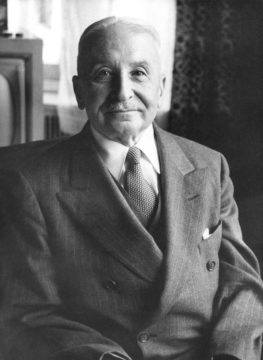 Isabella M. Weber in the Journal of the History of Ideas (photo by Ludwig von Mises Institute):
Isabella M. Weber in the Journal of the History of Ideas (photo by Ludwig von Mises Institute):
Ludwig von Mises’s theoretical claim that economically rational socialism was impossible sparked the “socialist calculation debate” of the interwar period and established the Austrian economist as a founding father of neoliberal economic thinking. In his article “Economic Calculation in the Socialist Commonwealth” (1935 [1920]), Mises argued that while the world was “approaching nearer and nearer to socialism,” economics figured “all too sparsely in the glamorous pictures painted by the Utopians.” They promised that “in the cloud-cuckoo lands of their fancy, roast pigeons will in some way fly into the mouths of the comrades,” but, according to Mises, “omit[ted] to show how this miracle is to take place.” And in Mises’s eyes, this “miracle” was in fact logically impossible.
Mises saw socialism as a system based on public ownership that excluded the means of production from exchange and relied on planning instead. Under socialism money played only a limited role as the medium of exchange for consumer goods and could not serve as a meaningful standard for economic calculation. Without universal market exchange based on private property and a universally employed medium of exchange (genuine money), Mises argued, a socialist economy lacked any yardstick for values or prices and thus did not have a rational criterion for allocation and production decisions. To Mises, socialism could never be organized in an economically rational way and would always rely on arbitrary decisions by planners and production managers; the envisioned socialist economic miracle would never occur. Mises went as far as to claim that “Without economic calculation there can be no economy. Hence, in a socialist state wherein the pursuit of economic calculation is impossible, there can be … no economy whatsoever.” Mises added that this impossibility of economic rationality under socialism might even result in a general disappearance of “rationality and logic in thought itself.”
More here.
